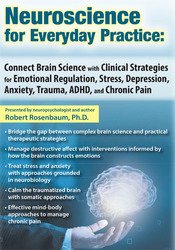

Scientific research on the human brain’s connection to our mental and physical well-being continues to astound. While dazzling pictures and scientific lingo certainly impress, mental health clinicians are faced with a pressing problem. How do I connect the power of neuroscience to my everyday work with clients facing stress, anxiety, emotional dysregulation, trauma, chronic pain, and other issues?
As a neuropsychologist, Robert Rosenbaum, Ph.D., has spent his career working with the brain-behavior relationship. His expertise in the principles of neuroscience, functional neuroanatomy, and diagnostics give him a unique insight into the correlation between mental health disorders, therapeutic approaches, and what happens in the brain itself.
This integrative recording will show you how to fundamentally transform your practice by linking complicated science to practical and accessible clinical techniques you can use every day!
Key benefits of watching:
Discover how incorporating neuroscience into your therapy can rejuvenate your practice and provide the spark you need to change clients’ perceptions and improve their lives!
This online program is worth 6.0 hours CPD.
| File type | File name | Number of pages | |
|---|---|---|---|
| Manual (66.51 MB) | 63 Pages | Available after Purchase | |
| (Very large: Do not advise printing) One slide per page manual (62.29 MB) | 250 Pages | Available after Purchase |

Robert Rosenbaum, Ph.D., has 30 years’ experience as a neuropsychologist, psychotherapist and behavioral medicine specialist. In addition to his numerous journal articles and book chapters on brief psychotherapy, he is also the author of the books Zen and the Heart of Psychotherapy; Walking the Way: 81 Zen Encounters with the Tao Te Ching and co-editor of What's Wrong with Mindfulness (and what isn't). He is entrusted as a Zen teacher by Sojun Roshi of Berkeley and San Francisco Zen Centers and as a senior teacher of Dayan (Wild Goose) Qigong by Master Hui Liu of the Wen Wu School.
Dr. Rosenbaum worked for over 26 years at Kaiser Permanente clinics in California, where at various times he was chief psychologist, head of the neuropsychological assessment program, developed the mindfulness-based behavioral portion of the chronic pain management program in Kaiser Oakland and started the first programs of Dayan Qigong (which subsequently spread to medical clinics throughout California). He also did research on brief psychotherapy, single-session therapy and psychotherapy integration.
In addition, he has been a Fulbright Professor at the National Institute of Mental Health and Neurosciences in India, the director of the doctoral training program at the California Institute of Integral Studies, and a consultant on brief psychotherapy to clinics and academic institutions in Australia, Japan, and Canada. Whenever he can, he spends several months a year hiking in the Sierras and the Himalayas.
Speaker Disclosures:
Financial: Robert Rosenbaum receives a speaking honorarium from PESI, Inc. He has no relevant financial relationships with ineligible organizations.
Non-financial: Robert Rosenbaum has no relevant non-financial relationship to disclose.
Manage Destructive Emotions With Effective Brain-Based Approaches
Stress in a Fast-Paced World: Therapeutic Strategies Informed by Biological Time and Brain Clocks
ADHD, Inattention, Hyperactivity, and Impulsivity: The Biology of Attention and Brain-centric Interventions
Trauma: Clinical Techniques Informed by the Science of Memory
Rewire the Brain to Ease Chronic Pain
Satisfaction Guarantee
Your satisfaction is our goal and our guarantee. Concerns should be addressed to info@pesi.co.uk or call 01235847393.
Please wait ...